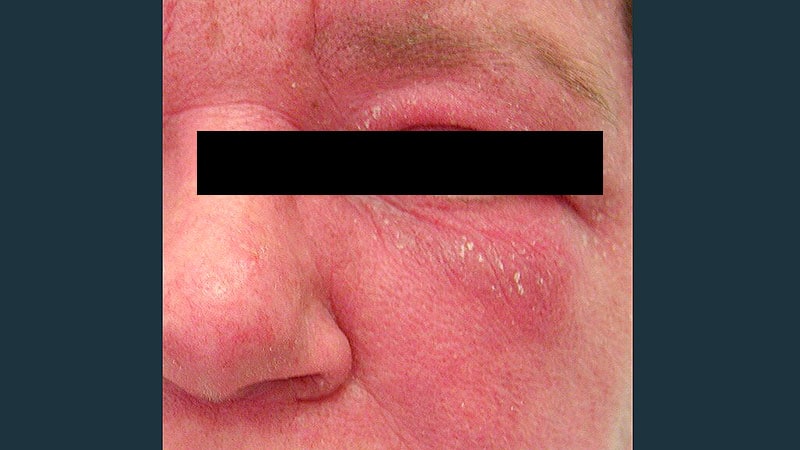TOPLINE:
Treatment with dazukibart, a monoclonal antibody targeting interferon beta, yielded a rapid reduction in dermatomyositis disease activity in adults with skin-predominant and muscle-predominant dermatomyositis, with nearly all patients showing a clinically meaningful decrease at week 12.
METHODOLOGY:
- Researchers conducted a randomized phase 2 trial to evaluate the efficacy and safety of dazukibart in adults with skin-predominant and muscle-predominant dermatomyositis across five countries.
- Patients with skin-predominant disease (n = 57; 93% White individuals; 93% women) were enrolled into stages I, II, and IIa and those with muscle-predominant disease (n = 18; 89% White individuals; 72% women) were enrolled into stage III, with specific inclusion criteria based on disease severity and previous treatment failures.
- A total of 75 patients were randomly assigned to receive 600 mg dazukibart (n = 37), 150 mg dazukibart (n = 15), or placebo (n = 23) in various stages:
- Stage I: 600 mg dazukibart or placebo
- Stage II: 600 mg dazukibart, 150 mg dazukibart, or placebo
- Stage IIa: 600 mg dazukibart then placebo, 150 mg dazukibart then placebo, placebo then 600 mg dazukibart, or placebo then 150 mg dazukibart
- Stage III: 600 mg dazukibart then placebo or placebo then 600 mg dazukibart
- The follow-up period was 5 months for those in stages I and II and 4 months for those in stages IIa and III.
- The primary outcome was a change in the Cutaneous Dermatomyositis Disease Area and Severity Index-Activity (CDASI-A) score from baseline to week 12 in the full analysis set that included all patients in stage I and the pooled skin full analysis set that included all patients in stages I, II, and IIa.
TAKEAWAY:
- Dazukibart 600 mg led to a significant reduction in the CDASI-A score at week 12 in stage I compared with placebo (placebo-adjusted mean difference, −14.8; P
- In the pooled skin full analysis set, dazukibart showed a significant change in CDASI-A scores from baseline compared with placebo at both 600 mg (placebo-adjusted mean difference, −16.3; P P 5 points in the CDASI-A score at week 12.
- In the muscle full analysis set, the mean total improvement score for 600 mg dazukibart was numerically higher than that for placebo, although this was not statistically significant.
- Treatment-emergent adverse events were mostly mild and occurred in 80% of the 150-mg dazukibart group, 81% of the 600-mg dazukibart group, and 78% of the placebo group.
IN PRACTICE:
“Dazukibart offers a compelling new avenue for dermatomyositis management, particularly for patients with skin-predominant involvement,” wrote the authors of a related comment.
SOURCE:
The study was led by David Fiorentino, MD, PhD, Stanford University School of Medicine, Redwood City, California. It was published online on January 11, 2025, in The Lancet.
LIMITATIONS:
The small sample size may have limited the generalizability of the findings. The lack of data stratified by gender further limited the analysis. Additionally, the study was not powered to detect differences in efficacy outcomes for the muscle-predominant cohort.
DISCLOSURES:
This study was funded by Pfizer. Some authors reported having financial relationships with pharmaceutical companies, including Pfizer.
This article was created using several editorial tools, including AI, as part of the process. Human editors reviewed this content before publication.
Source link : https://www.medscape.com/viewarticle/dazukibart-shows-promise-treating-dermatomyositis-2025a100014j?src=rss
Author :
Publish date : 2025-01-17 06:37:35
Copyright for syndicated content belongs to the linked Source.
